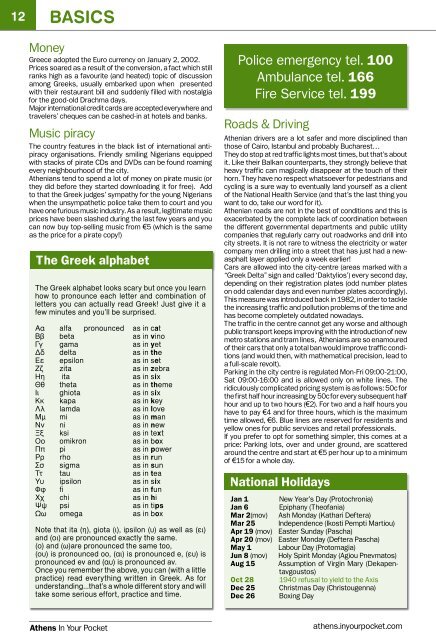IYP Athens Oct/Nov 2009 (6MB) - In Your Pocket GmbH
IYP Athens Oct/Nov 2009 (6MB) - In Your Pocket GmbH
IYP Athens Oct/Nov 2009 (6MB) - In Your Pocket GmbH
You also want an ePaper? Increase the reach of your titles
YUMPU automatically turns print PDFs into web optimized ePapers that Google loves.
12 BAsiCs<br />
Money<br />
Greece adopted the Euro currency on January 2, 2002.<br />
Prices soared as a result of the conversion, a fact which still<br />
ranks high as a favourite (and heated) topic of discussion<br />
among Greeks, usually embarked upon when presented<br />
with their restaurant bill and suddenly filled with nostalgia<br />
for the good-old Drachma days.<br />
Major international credit cards are accepted everywhere and<br />
travelers’ cheques can be cashed-in at hotels and banks.<br />
Music piracy<br />
The country features in the black list of international antipiracy<br />
organisations. Friendly smiling Nigerians equipped<br />
with stacks of pirate CDs and DVDs can be found roaming<br />
every neighbourhood of the city.<br />
Athenians tend to spend a lot of money on pirate music (or<br />
they did before they started downloading it for free). Add<br />
to that the Greek judges’ sympathy for the young Nigerians<br />
when the unsympathetic police take them to court and you<br />
have one furious music industry. As a result, legitimate music<br />
prices have been slashed during the last few years and you<br />
can now buy top-selling music from €5 (which is the same<br />
as the price for a pirate copy!)<br />
The Greek alphabet<br />
The Greek alphabet looks scary but once you learn<br />
how to pronounce each letter and combination of<br />
letters you can actually read Greek! Just give it a<br />
few minutes and you’ll be surprised.<br />
Αα alfa pronounced as in cat<br />
Ββ beta as in vino<br />
Γγ gama as in yet<br />
Δδ delta as in the<br />
Εε epsilon as in set<br />
Ζζ zita as in zebra<br />
Ηη ita as in six<br />
Θθ theta as in theme<br />
Ιι ghiota as in six<br />
Κκ kapa as in key<br />
Λλ lamda as in love<br />
Μμ mi as in man<br />
Νν ni as in new<br />
Ξξ ksi as in text<br />
Οο omikron as in box<br />
Ππ pi as in power<br />
Ρρ rho as in run<br />
Σσ sigma as in sun<br />
Ττ tau as in tea<br />
Υυ ipsilon as in six<br />
Φφ fi as in fun<br />
Χχ chi as in hi<br />
Ψψ psi as in tips<br />
Ωω omega as in box<br />
Note that ita (η), giota (ι), ipsilon (υ) as well as (ει)<br />
and (οι) are pronounced exactly the same.<br />
(ο) and (ω)are pronounced the same too,<br />
(ου) is pronounced oo, (αι) is pronounced e, (ευ) is<br />
pronounced ev and (αυ) is pronounced av.<br />
Once you remember the above, you can (with a little<br />
practice) read everything written in Greek. As for<br />
understanding...that’s a whole different story and will<br />
take some serious effort, practice and time.<br />
<strong>Athens</strong> <strong>In</strong> <strong>Your</strong> <strong>Pocket</strong><br />
Police emergency tel. 100<br />
Ambulance tel. 166<br />
Fire Service tel. 199<br />
Roads & Driving<br />
Athenian drivers are a lot safer and more disciplined than<br />
those of Cairo, Istanbul and probably Bucharest…<br />
They do stop at red traffic lights most times, but that’s about<br />
it. Like their Balkan counterparts, they strongly believe that<br />
heavy traffic can magically disappear at the touch of their<br />
horn. They have no respect whatsoever for pedestrians and<br />
cycling is a sure way to eventually land yourself as a client<br />
of the National Health Service (and that’s the last thing you<br />
want to do, take our word for it).<br />
Athenian roads are not in the best of conditions and this is<br />
exacerbated by the complete lack of coordination between<br />
the different governmental departments and public utility<br />
companies that regularly carry out roadworks and drill into<br />
city streets. It is not rare to witness the electricity or water<br />
company men drilling into a street that has just had a newasphalt<br />
layer applied only a week earlier!<br />
Cars are allowed into the city-centre (areas marked with a<br />
“Greek Delta” sign and called ‘Daktylios’) every second day,<br />
depending on their registration plates (odd number plates<br />
on odd calendar days and even number plates accordingly).<br />
This measure was introduced back in 1982, in order to tackle<br />
the increasing traffic and pollution problems of the time and<br />
has become completely outdated nowadays.<br />
The traffic in the centre cannot get any worse and although<br />
public transport keeps improving with the introduction of new<br />
metro stations and tram lines, Athenians are so enamoured<br />
of their cars that only a total ban would improve traffic conditions<br />
(and would then, with mathematical precision, lead to<br />
a full-scale revolt).<br />
Parking in the city centre is regulated Mon-Fri 09:00-21:00,<br />
Sat 09:00-16:00 and is allowed only on white lines. The<br />
ridiculously complicated pricing system is as follows: 50c for<br />
the first half hour increasing by 50c for every subsequent half<br />
hour and up to two hours (€2). For two and a half hours you<br />
have to pay €4 and for three hours, which is the maximum<br />
time allowed, €6. Blue lines are reserved for residents and<br />
yellow ones for public services and retail professionals.<br />
If you prefer to opt for something simpler, this comes at a<br />
price: Parking lots, over and under ground, are scattered<br />
around the centre and start at €5 per hour up to a minimum<br />
of €15 for a whole day.<br />
National Holidays<br />
Jan 1 New Year’s Day (Protochronia)<br />
Jan 6 Epiphany (Theofania)<br />
Mar 2(mov) Ash Monday (Kathari Deftera)<br />
Mar 25 <strong>In</strong>dependence (Ikosti Pempti Martiou)<br />
Apr 19 (mov) Easter Sunday (Pascha)<br />
Apr 20 (mov) Easter Monday (Deftera Pascha)<br />
May 1 Labour Day (Protomagia)<br />
Jun 8 (mov) Holy Spirit Monday (Agiou Pnevmatos)<br />
Aug 15 Assumption of Virgin Mary (Dekapen-<br />
tavgoustos)<br />
<strong>Oct</strong> 28 1940 refusal to yield to the Axis<br />
Dec 25 Christmas Day (Christougenna)<br />
Dec 26 Boxing Day<br />
Olympic Games<br />
After being refused the centenary modern Olympics of 1996,<br />
<strong>Athens</strong> was finally awarded the Games of 2004. Against all<br />
international media odds, who worked overtime for their<br />
respective governments, each outbidding the next in their<br />
efforts to sell overpriced and useless security systems, the<br />
city organised a wonderful and absolutely safe Olympiad<br />
that filled all Greeks with a sense of national solidarity and<br />
pride - and rightly so. This was, surely enough, before they<br />
were presented with the eight billion Euro bill, whereupon<br />
everyone came to the conclusion that the Olympics are no<br />
business for a small country like this one...<br />
Smoking<br />
Smoking has been banned in all<br />
public areas in Greece since July<br />
1. However, like everything else in<br />
this country, the ban is not a simple<br />
blanket measure for all. Establishments<br />
over 70 sqm are obliged to<br />
provide separate smoking rooms<br />
and owners of places under 70 sqm<br />
are free to decide whether theirs will<br />
be a smoking place or not! So far the<br />
results have been satisfactory in most working places, but<br />
most bars and many restaurants seem to ignore the new<br />
law not least because they had the Greek summer on their<br />
side and most people stayed outdoors. The true test to the<br />
Greek smokers’ obedience to the new law will be when the<br />
weather gets cold soon and the smoking crowds must move<br />
indoors (it will be fun to see people sitting inside glass boxes<br />
in bouzoukia nightclubs!). Until then, relax and light up, you<br />
are in wonderful Greece where laws rarely get in the way of<br />
people’s lives.<br />
<strong>Athens</strong> Portraits [7]<br />
The (Loud) Voice of the People<br />
<strong>In</strong> case you haven’t already heard it several times since<br />
arriving in <strong>Athens</strong>, this is where Democracy was born. And<br />
2,500 years later, you’ll find no shortage of folk ready and<br />
willing to exercise their democratic right to protest – loudly,<br />
and often.<br />
Every week, somewhere Down<br />
Town, you’ll find a group of demonstrators<br />
making their feelings<br />
felt by marching down the street,<br />
banners in hand, chanting and<br />
banging on drums. It’s part of the<br />
tradition of resistance in one of the<br />
few countries to have a National<br />
Day celebrating a famous “No” from<br />
its history (Prime Minister Metaxa’s<br />
reply on 28 <strong>Oct</strong>ober 1940 when<br />
Mussolini asked him to hand the<br />
country over).<br />
So, don’t be surprised if you leave<br />
Syntagma Metro station, or step<br />
off the bus at Klafthmonos Square,<br />
to find a mob of snarling students, furious farmers, cross<br />
college professors, growling grandfathers, livid lawyers or<br />
enraged ecologists chanting slogans and waving banners<br />
declaring “Hands off our pensions/jobs/education/forests”<br />
(take your pick).<br />
Protests are frequent, noisy and disruptive for anyone who<br />
needs to get somewhere in a hurry. Streets are blocked off,<br />
shops close, traffic is diverted, and knots of riot police<br />
BAsiCs<br />
Stray dogs<br />
<strong>Athens</strong>’ streets are littered with thousands of stray dogs,<br />
a fact that, according to animal welfare organisations, constitutes<br />
bad publicity for the city. The truth is, however, that<br />
many of these animals are not abandoned in the streets but<br />
are actually born there and live in neighbourhoods where<br />
people feed and water them on a daily basis. Just before<br />
the Olympic Games, most strays were rounded up by the<br />
authorities, vaccinated and sterilised, only to be placed right<br />
back in their natural habitat, the streets. Most of them wear<br />
collars and are harmless and quite friendly.<br />
Tipping<br />
Service charge is included in the bill in all restaurants and<br />
cafés but if you are pleased with the service it is customary<br />
to leave a few euros on the table. Ten percent is considered<br />
generous; something around five percent is the most<br />
common practice. Tipping is expected in most expensive<br />
hotels and taxi drivers will round up the amount themselves<br />
when they give you the change, so you shouldn’t worry<br />
about this!<br />
Visas<br />
There is no visa requirement to enter Greece for citizens<br />
of the E.U., Australia, Canada, Iceland, Israel, Japan, New<br />
Zealand, Norway, Switzerland and the US.<br />
For a full list of countries exempt from visa requirements for<br />
up to 90 days visit you can consult the Greek Foreign Ministry<br />
website at: www.ypex.gov.gr.<br />
The <strong>Athens</strong> tel. code is +30 210<br />
gather at strategic spots - just in case something gets<br />
out of hand.<br />
Most of the time, they don’t. But there are times – like<br />
the anniversary of the storming of the Polytechnic on 17<br />
<strong>Nov</strong>ember 1973 which sparked the fall of the dictatorship,<br />
or last December’s riots after the police shooting of a teenager<br />
in Exarchia – when it can<br />
get serious. Stones are thrown,<br />
shop windows smashed, rubbish<br />
bins set alight, cars overturned<br />
and Molotov cocktails hurled,<br />
prompting Kevlar-clad police<br />
to respond with batons and<br />
tear gas.<br />
Every demonstration will include<br />
the ‘usual suspects’ like the<br />
organised anarchists (surely a<br />
contradiction of terms?), political<br />
agitators, those who just enjoy<br />
the thrill of the fight, and rubbernecking<br />
spectators keen to get<br />
a whiff of the action.<br />
But there are also dozens of civil<br />
servants, teachers, students, utility workers and more who<br />
voice their outrage about the injustices and outrages that<br />
affect them.<br />
At least, until the next day, when those same ordinary men<br />
and women will complain bitterly over their coffee about<br />
the ‘trouble-makers’ disrupting the city and stopping them<br />
from getting to work on time.<br />
athens.inyourpocket.com athens.inyourpocket.com<br />
<strong>Oct</strong>ober - <strong>Nov</strong>ember <strong>2009</strong><br />
13







